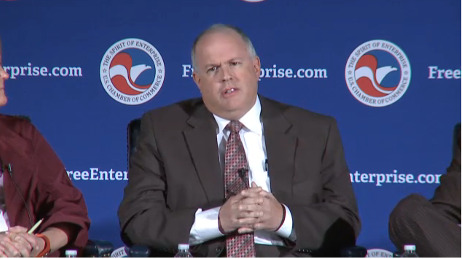NADA, Capital One Counsels Reiterate CFPB Questions

Andy Koblenz, executive vice president and general counsel for National Automobile Dealers Association, appeared on a panel last week during the Capital Markets Summit orchestrated by the U.S. Chamber.
By subscribing, you agree to receive communications from Auto Remarketing and our partners in accordance with our Privacy Policy. We may share your information with select partners and sponsors who may contact you about their products and services. You may unsubscribe at any time.
WASHINGTON, D.C. –
Andy Koblenz, executive vice president and general counsel for the National Automobile Dealers Association, heard leaders from the Consumer Financial Protection Bureau speak last week and again left with questions about how the new regulatory agency intends to oversee vehicle financing.
Koblenz indicated during a panel session of an event hosted by the U.S. Chamber of Commerce that two points struck him during earlier remarks from CFPB deputy director Steve Antonakes.
“He talked about their commitment to providing clear rules of the road. And yet when you look at the indirect auto lending area, every indirect auto lender that I’ve spoken to when I asked them if they understand what the methodology that the CFPB is using for their disparate impact analysis, whether it’s the proxy methodology of the statistical controls methodology, they all say no and they’re still guessing at it,” Koblenz told attendees at the eighth annual Capital Markets Summit orchestrated by the chamber’s Center of Capital Markets Competitiveness.
Koblenz acknowledged that Antonakes stated the bureau intends to be more forthcoming on how it plans to exercise its methodology. Koblenz offered an analogy to show the quandary finance companies face nowadays.
“It’s almost like the cop standing by the side of the road and pulling people over for speeding. Someone says I want to comply and the cop says I’m not going to tell you. I’ll look back after the fact and tell you if you were speeding or not. That’s not fair and it’s ultimately going to drive credit out of the market,” Koblenz said.
With last Friday marking the one-year anniversary since the CFPB issued its guidance into how indirect auto lending operations are supposed to operate, Koblenz noted that he perked up again when Antonakes insisted the CFPB is an evidence-based organization
Subscribe to Auto Remarketing to stay informed and stay ahead.
By subscribing, you agree to receive communications from Auto Remarketing and our partners in accordance with our Privacy Policy. We may share your information with select partners and sponsors who may contact you about their products and services. You may unsubscribe at any time.
“They’ve chosen to address issues in the indirect auto lending model through the issue of guidance. Yet they didn’t conduct any rulemaking. They didn’t take any public comment. They didn’t receive any input from the industry from any of the players in the industry and I think it’s led to some bad outcomes,” Koblenz said.
“Their solution to the indirect lending model and to address concerns if they exist in the fair lending world is to drive the industry to an indiscretionary, flat-fee model. But had they conducted rulemaking, they would have received comments saying that flat fee doesn’t eliminate discretion because the dealers don’t have the choice of which lender to work (with), so you would have interlender discretion not intra-lender discretion. You simply can’t eradicate discretion if that’s the cause of the problem by going to a flat fee,” he went on to say.
Koblenz’s fellow panelist raised issues not only with how the CFPB’s guidance arrived but also how the bureau is taking enforcement actions against only a small handful of institutions. Those points came from Andy Navarrete, senior vice president and chief counsel at Capital One.
“There are 5,000 auto lenders in this country. Tackling individual institutions via supervision enforcement may change behaviors at those individual companies but it’s not going to move markets in a way that produces consistent rules of the road for the industry, clear expectations of dealers and clear results and predictable outcomes for consumers,” Navarrete said.
Koblenz closed by reiterating NADA and other associations contend there are solutions available “that both address fair lending risk and retain competitive and flexibility in the marketplace but the bureau’s guidance approach seems to be turning down the opportunity.”
The NADA legal expert added, “There are reasonably reliable studies that show in the auto lending arena the ability to get an auto loan is clearly a step up the ladder of economic progression. The difference between having a car and not having a car means the jobs that are available to you are the ones on the public transportation grid. With a car, the universe of jobs expands dramatically. During the financial crisis we heard stories from people who gave their mortgage back to the bank but paid on their car loans because ultimately they could sleep in their car but couldn’t drive their house.
“The access to credit in our industry is really a step up the economic ladder. It’s a point we need to remind people to overcome this demonanization that has happened over the last few years,” Koblenz went on to say.


